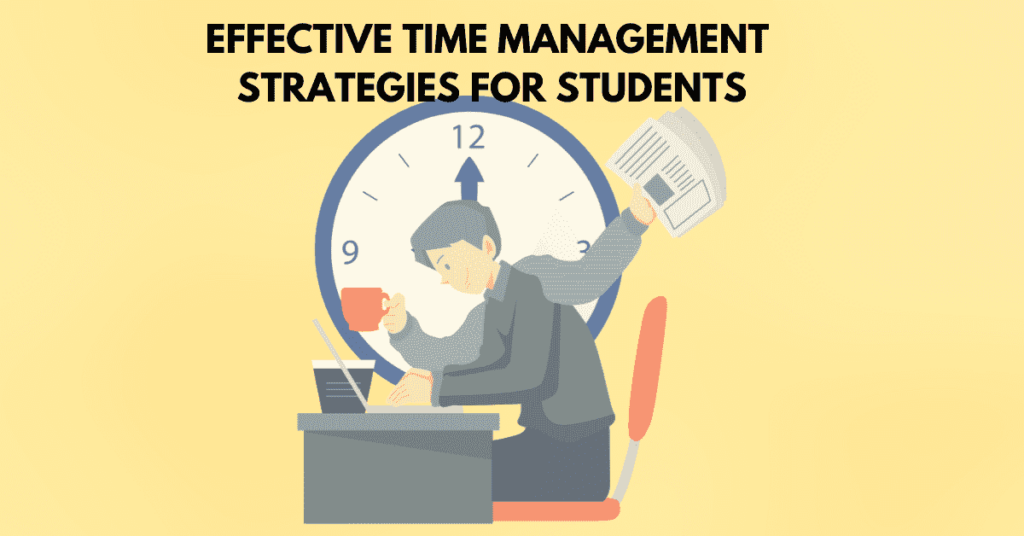In today’s fast-paced academic environment, mastering effective time management strategies for students is crucial. Juggling classes, assignments, extracurricular activities, and social life can be overwhelming. However, with the right approach, students can manage their time efficiently, reducing stress and enhancing academic performance. This article delves into student time management tips, exploring the best techniques and providing actionable advice on how to manage time effectively as a student.
Why Time Management Matters for Students
Time management is more than just planning your day; it’s about making conscious decisions to prioritize and allocate your time wisely. For students, effective time management can lead to better grades, less stress, and more free time. Understanding the importance of time management is the first step toward implementing successful strategies.
Assessing Your Current Time Management
Before diving into new strategies, assess how you currently spend your time. Track your daily activities for a week and identify patterns or areas where time is wasted. This self-awareness is the foundation of effective time management.
Setting Clear Goals and Priorities
Setting clear goals is a cornerstone of effective time management. Define short-term and long-term academic goals. Prioritize tasks based on their importance and deadlines. Utilize tools like the Eisenhower Matrix to categorize tasks into urgent, important, and non-essential.
Creating a Balanced Schedule
A balanced schedule is essential for maintaining productivity and well-being. Incorporate time for classes, study sessions, extracurricular activities, and relaxation. Ensure your schedule is realistic and allows for breaks to avoid burnout.
Utilizing a Planner or Digital Calendar
Whether you prefer a physical planner or a digital calendar, these tools are indispensable for managing time. Schedule your tasks, deadlines, and activities. Regularly update your planner to reflect changes and stay organized.
Implementing the Pomodoro Technique
The Pomodoro Technique is one of the best time management techniques for students. It involves working in focused intervals (usually 25 minutes) followed by short breaks. This method enhances concentration and productivity, making study sessions more effective.
Breaking Down Large Tasks
Large tasks can be daunting and lead to procrastination. Break down assignments and projects into smaller, manageable tasks. Set mini-deadlines for each segment to maintain progress and avoid last-minute stress.
Avoiding Multitasking
Multitasking often reduces efficiency and increases errors. Focus on one task at a time to enhance the quality of your work and complete tasks faster. This approach is particularly beneficial during study sessions.
Prioritizing High-Impact Activities
Identify activities that have the most significant impact on your academic success. Focus your energy on these high-impact activities. This could include studying for major exams, working on important projects, or attending crucial classes.
Utilizing Dead Time
Utilize “dead time” or periods that might otherwise go to waste, such as commuting or waiting in line, for productive activities. Review notes, listen to educational podcasts, or brainstorm ideas during these times.
Practicing Self-Care
Effective time management includes time for self-care. Ensure you get enough sleep, exercise, and relaxation. A healthy body and mind enhance productivity and focus.
Developing a Morning Routine
A structured morning routine sets a positive tone for the day. Include activities that boost energy and focus, such as exercise, healthy breakfast, and planning the day’s tasks. A good start can significantly improve your overall productivity.
Eliminating Distractions
Identify common distractions and take steps to minimize them. This might include turning off notifications, creating a dedicated study space, or using apps designed to block distracting websites.
Reviewing and Adjusting Your Schedule
Regularly review your schedule and make adjustments as needed. Flexibility is key to effective time management. Evaluate what strategies are working and modify those that aren’t.
Seeking Help When Needed
Don’t hesitate to seek help if you’re struggling to manage your time. Academic advisors, tutors, and counselors can provide guidance and support. Collaboration with classmates can also help distribute workloads more evenly.
Time Management Tips for High School Students
High school students face unique challenges. Here are specific time management tips for high school students:
- Create a Homework Plan: Allocate specific times for homework each day to avoid last-minute cramming.
- Use Class Time Wisely: Utilize free periods and study halls for completing assignments or reviewing notes.
- Set Up a Study Group: Collaborative learning can enhance understanding and reduce individual workload.
- Balance Extracurricular Activities: Ensure extracurricular commitments don’t overwhelm academic responsibilities.
College Student Time Management Strategies
College students often have more independence but also more responsibilities. Here are some tailored college student time management strategies:
- Syllabus Mapping: At the beginning of the semester, map out all major assignments and exams to plan ahead.
- Time Blocking: Allocate blocks of time for different activities, such as studying, attending classes, and leisure.
- Prioritize Self-Study: College requires significant self-study. Schedule dedicated study times outside of classes.
- Use Campus Resources: Take advantage of campus resources like libraries, study centers, and academic workshops.
How to Manage Time Effectively as a Student
Managing time effectively as a student involves a combination of planning, discipline, and adaptability. Here’s a comprehensive approach:
- Plan Ahead: Use weekly and monthly planners to keep track of assignments, exams, and personal commitments.
- Stay Disciplined: Stick to your schedule as closely as possible. Discipline is crucial for maintaining productivity.
- Adapt and Overcome: Be prepared to adjust your plans when unexpected events occur. Flexibility ensures you stay on track despite disruptions.
Effective Study Techniques
Integrating effective study techniques into your time management plan can boost academic performance. Here are some strategies:
- Active Learning: Engage with the material through discussions, teaching others, and practical applications.
- Spaced Repetition: Spread out your study sessions over time rather than cramming, which improves long-term retention.
- Mind Mapping: Create visual maps to organize information, making it easier to understand and remember.
The Role of Technology in Time Management
Technology can be a powerful ally in time management. Utilize apps and tools designed to enhance productivity:
- Task Management Apps: Tools like Todoist or Trello help organize and prioritize tasks.
- Calendar Apps: Google Calendar and Apple Calendar are great for scheduling and reminders.
- Focus Apps: Apps like Forest and Focus@Will help minimize distractions and maintain focus.
Balancing Academic and Personal Life
Achieving a balance between academic and personal life is crucial for overall well-being. Here are some tips:
- Set Boundaries: Define clear boundaries between study time and personal time to avoid burnout.
- Schedule Social Activities: Plan social activities in your schedule to ensure you have time to relax and recharge.
- Practice Mindfulness: Mindfulness techniques can help manage stress and maintain focus.
How TheTuitionTeacher Can Help with Time Management
TheTuitionTeacher offers personalized tutoring services that can significantly aid in time management for students. Here’s how:
1. Customized Study Plans
Tutors from TheTuitionTeacher can help create customized study plans tailored to the student’s academic needs and schedules, ensuring effective use of study time.
2. Focused Learning Sessions
One-on-one tutoring sessions focus on the student’s weak areas, making learning more efficient and time-effective.
3. Regular Progress Tracking
Tutors regularly track the student’s progress and adjust study plans as needed, ensuring that the student stays on track and makes continuous improvement.
4. Flexible Scheduling
TheTuitionTeacher offers flexible scheduling options, allowing students to choose tutoring sessions that fit their busy schedules, helping them manage their time better.
5. Academic Support
Tutors provide academic support beyond just subject knowledge, including study techniques, exam preparation strategies, and time management tips, equipping students with the skills needed to excel academically.
Conclusion
Effective time management strategies for students is essential for students to achieve academic success and maintain a balanced life. By implementing the strategies and tips outlined in this blog, students can manage their time more effectively, reduce stress, and improve their overall academic performance. With the additional support from TheTuitionTeacher, students can further enhance their time management skills and achieve their educational goals.







